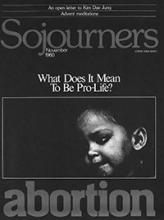I reject the notion of those who say that abortion is only a woman's issue...Such a view is parallel to saying that war is a man's problem, or that capital punishment is a legal problem, or the poor are an economic problem.... What we have to work toward is the realization that every human being belongs to a community....
I think that women do a great disservice by isolating the fate of the unborn as their own problem. This is biologically and spiritually absurd.... And it isolates the woman at just that point where male responsibility needs to be jolted....
I come to the abortion question by way of a long, long experience with the military and the mainline violence of the culture expressed in war. There I see the dead end of disrespect and contempt for life; the main project--in fact, the only project--is murder. So I go from the Pentagon and being arrested there, to the cancer hospital, and then I think of abortion clinics, and I see an "interlocking directorate" of death that binds the whole culture; that is, an unspoken agreement that we will solve our problems by killing people in various ways, a declaration that certain people are expendable, outside the pale....
I have yet to meet a person involved in an abortion who is not haunted by that memory. I only wish in a bitter sort of way, that those involved in the military or the execution of a prisoner could be haunted by their memories.
But abortion is exceptional. It is so personally maiming. It implicates the person in ways we cannot innoculate against. It strikes us in a way that mass killing does not. Maybe that will be our salvation, that in abortion we have some inkling of a life being snuffed out. Other forms of killing have become so institutionalized that torturers, generals, wardens of death houses find it mechanical. We know the debased jargon: "I was only doing my job." But you don't hear a person who has had an abortion say, "I was only doing my job...."
Read the Full Article

